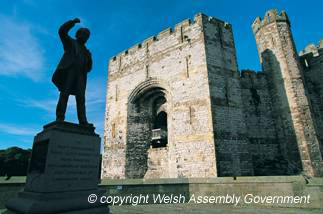 David Lloyd George, a Welsh speaker, was the first, and so far only, Welsh prime minister.
David Lloyd George, a Welsh speaker, was the first, and so far only, Welsh prime minister.
In 1885, he set up his own solicitors practice which flourished. He was by this time politically-active for the Liberal Party and in 1888 he founded a political newspaper, Udgorn Rhyddid (Trumpet of Freedom).
His activism and a legal victory to protect non-conformists' burial rights led to his selection as Liberal candidate for Caernarfon Boroughs in 1888.
He became Alderman for Caernarfon County Council, and was active in making moves to set up a Welsh National Party based on the Irish model.
A very narrow victory for Lloyd George in 1890 in the constituency led to him taking his seat in the House of Commons as the youngest member of parliament.
His core beliefs were centred around the disestablishment of the Church of England in Wales and Welsh devolution, but for the time being as a back-bench MP he couldn't shake up the establishment. Instead, he set up a legal practice in London to pay the bills and campaigned around the UK on issues such as temperance.
He also campaigned long and loud on Welsh issues, and became the unofficial spokesman for the Welsh Liberals in parliament. He also became know for vehement criticism of his own party's government on issues such as the Second Boer War and the Education Act.
In 1905 he attained his first cabinet post as president of the Board of Trade, being successful in both legislation and trade relations. Then he became chancellor of the exchequer in 1908.
As chancellor he put in place a range of social benefits such as old age pensions, unemployment benefits and sickness benefits - some historians believe the creation of a vestigial welfare state helped prevent a violent element to the working class' campaigns for social reform.
World War One saw Lloyd George become munitions minister then war secretary, establishing him as a governmental all-rounder.
He became prime minister of a coalition government during the war, but the compromise nature of his war cabinet was a cause of some of the legendary military blunders of the campaign. It did have its successes, however, and was a model for future wartime government.
His government during the war has been largely praised for its ingenuity in domestic schemes and policies, which were largely replicated in War War Two.
As prime minister in the immediate post-war period, he participated in the infamous Versailles Treaty, which squeezed Germany of its wealth and dignity, leading to the rise of Hitler during the next two decades.
His own stance was not as extreme as his colleagues at the Versailles Peace Conference, as he did not want to ruin the German state and people. He was not successful in ameliorating the treaty's treatment of Germany.
Under his premiership, Ireland gained independence in violent circumstances, precipitating a collapse in his power exacerbated by schisms in his coalition, and a scandal involving cash for honours.
His premiership ended in 1922 when the Conservatives withdrew from his coalition and the Liberals began their slide into third place behind the emergent Labour Party. In 1929 he became Father of the House (of Commons), as by this time he was the longest-serving MP.
During the 1930s he saw the threat of Hitler grow, and he disagreed with the government's appeasement of the German dictator. Then in 1940 he made a speech undermining the prime minister, Neville Chamberlain, and easing Winston Churchill's passage to the premiership.
In 1945 he was made Earl Lloyd George of Dwyfor and Viscount Gwynedd, but he died at the age of 82 without ever taking his seat in the House of Lords.
點擊查看本頻道更多精彩內容